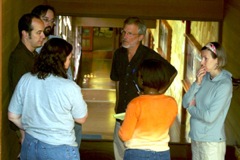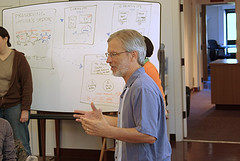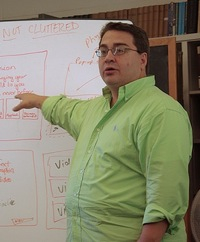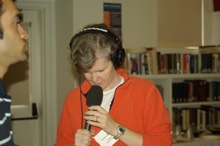
For five and a half days, a group of mostly newspaper journalists (with a few broadcasters and non-profit folks thrown in) took an intensive boot camp multimedia training at UC Berkeley through the Knight Digital Media Center. The idea was to learn as much as possible about shooting and editing video, capturing and editing audio, building Flash animations, doing on-camera work, and finding out how journalism is changing due to new technology.
I followed along as a class “auditor” for the week, and made it to about 80% of the sessions. I even got to join one of the teams (Team Gecko), going out to report on a story and helping to put it together. My overall take on the week was that there was a lot to learn, and our brains were stuffed to overflowing after starting each day at 8:30 am and going until about 9 pm — with very few breaks in the action.
I enjoyed getting quick overviews on software such as Flash Pro, Final Cut Pro and Soundtrack Pro, while getting hands-on time with high-end video and audio capture gear. The trainers from UC Berkeley — along with the slew of grad students — helped us out even when we were clueless and clumsy. The talks from speakers also helped us get our bearings on what was going on in the outside world, whether at the El Paso Times or Current TV or the BBC.
My biggest concern was having to swallow so much information in so little time. It would have been nice to have more time to work on projects and on the software, and a bit less time with the speakers. There was also very little time for socializing with other fellows in the program, outside of nighttime drinks here and there. Maybe one more day added to the agenda would have helped in that regard.
Participants Give Feedback
I polled some participants in the training, and here are some highlights of what they told me via email.
What were some of the best things about the training?

Karl Mondon, staff photographer and multimedia producer for the Contra Costa (Calif.) Times: [I enjoyed] leaving my hotel room at the Gothic-inspired 1930s-era, Julia Morgan-built Berkeley City Club and arriving a short walk later at a high-tech, totally-wired Graduate School of Journalism building at Cal where the newsroom of the future was being shown. It was like walking out of the Flintstones and into the Jetsons.
I liked both cartoons as a kid, but as a journalist, I can see the Jetsons paradigm is the winner. Getting slapped around with super-brief, intense tutorials on sound, video, and Flash applications for 13 hours a day, six days straight was a definite grind. It made me realize how little I know and how far I have to go if I want to be proficient in these new forms…The whole program is top-drawer, though. We were treated like royalty by people who truly enjoy what they are offering.
Laura Bischoff, staff writer of the Dayton (Ohio) Daily News in the Columbus bureau: The workshop showed what we can do on the Internet to feed that information machine. It showed me how with some different thinking, new skills and a pile of expensive equipment, I can crank out some super cool stuff.
I was also happy to see Aman Ali in action. He’s a 23-year-old reporter [at the Journal News in New York] who has been using Photoshop and Final Cut practically since preschool. He gets all jazzed up when he gets something to work just right but he said he gets equally excited when he snags a good quote and scoops his news competition. His enthusiasm is infectious.
Scott Anderson, video and technology editor at The Times of Shreveport, La.: I thought the training was terrific. I thought the skills/applications training was right on target. As someone who has dabbled more than a little bit in multimedia, this really gave me the confidence to know I can accomplish more online. And the storyboarding exercise gave me the tool to give the process some very critical thought — which has been the key component missing from multimedia efforts in our newsroom.

I definitely think they have the right slate of applications. With a grasp of the programs they taught this week, anyone can look like an online specialist.
I also enjoyed the speakers. I think it was great to hear from alumni of the program to see what they have done since. I especially enjoyed Jay [Koester] from El Paso. I think he taught us we don’t have to be so serious about everything. [Voice and on-camera coach] Marilyn Pittman was a terrific speaker/trainer. She put the spotlight on one key element of this whole process I think few print people give enough consideration: Audio really does drive a story, and she helped us all understand what good audio is all about.
What do you think could be improved about the training?
Mondon: Perhaps one day less of training and one day more of practice would have suited my personal needs. While the non-training presentations were quite interesting, I probably could have used more time to try and drill some of these new skills taught into my dense, gray-haired scalp.
For example, I couldn’t take the opportunity to play with Final Cut Pro with pros in the room, because I felt more compelled to work in Flash as much as possible. It seems “interactive” is the native characteristic of the web and those Flash skills seem the most elusive and non-intuitive.

Bischoff: I think the best way to improve the workshop is to make it half a day longer and direct the fellows to go through the tutorials before they arrive. I felt sort of shell-shocked by the rapid fire pace of some of the technical classes. I’d also like to come back in six months for a follow-up course.
And, it was a crime to have the workshop in such a beautiful setting but have no time to see the area. Might as well hold it in Flint, Michigan. No one would feel bad about being trapped in class from 9 to 9 every day there.
Anderson: My one issue with the conference is perhaps unavoidable in situations like this. The groups for the projects were a bit large for me. In my reality, I am fortunate when I can have time as a one-man band on a project like this. And two people is a luxury. Five people working on a project is too much, if you ask me. And so many creative and enthusiastic individuals working on one subject makes for a chaotic process.
*****
I’m curious to hear from other folks who took this training — or other similar boot camps. Please give your feedback in the comments below. Or if you’re a mid-career journalist, give your own take on what kind of training you’d like to get. How can traditional journalists get the skills to do original multimedia work online?
Read More about the Knight Digital Training:
> Live-Blogging the Multimedia Boot Camp for Newspaper Journalists
> Storyboarding Basics and Finding Your Dream Job
> Hands-On Training with Videocameras and Shooting for the Web
> Photography Training and Doing More with Less in El Paso
> Flash Techniques, and the Participatory Push by Current TV
All photos by Jerry Monti via Flickr.

Mark, great to see such thorough blogging! Having you was fantastic. Thank you so much for being part of our workshop. We were happy you were able to take part and share your experiences for those who are interested in learning a little bit about multimedia storytelling. We look forward to your return in July.